In a notice, the IRS has, pursuant to section 279 of the COVID-related Tax Relief Act of 2020 (COVIDTRA, part of the Consolidated Appropriations Act, 2021 (CAA, 2021, PL 116-26), waived the requirement to file certain information returns or furnish certain payee statements.
Background—reporting requirements. If a person cancels the debt owed to them by a debtor, then the person must report the amount of discharged debt on a Form 1099-C, Cancellation of Debt, with the IRS. (Instructions to Form 1099-C)
Also, generally, a payer must file a Form 1099-MISC, Miscellaneous Information, when the payer makes a payment to a person in the course of the payer’s trade or business. (Instructions to Form 1099-MISC)
Background—exceptions to cancellation of debt income and other income recognition rules. Recent legislation related to the COVID-19 pandemic has introduced some exceptions to the general rules regarding income recognition, including the cancellation of debt income rules.
COVIDTRA provide that, for tax years ending after March 27, 2020, no amount is included in the gross income of an eligible recipient by reason of forgiveness of a Paycheck Protection Program (PPP) covered loan (i.e., a loan guaranteed by the PPP). See Business provisions of the CAA, 2021 (12/23/2020).
In addition, the Economic Aid to Hard-Hit Small Businesses, Nonprofits, and Venues Act (Economic Aid Act, Title III of Division N of the CAA, 2021) authorizes Paycheck Protection Program Second Draw (PPP II) covered loans for qualifying businesses. COVIDTRA provides that no amount of a forgiven PPP II loan is included in the gross income of an eligible entity.
Sections 3504, 18004, and 18008 of the Coronavirus Aid, Relief, and Economic Security Act (PL 116-136, CARES Act) authorize institutions of higher learning to award emergency financial aid grants to assist students with unexpected expenses and unmet financial needs that result from a qualifying emergency and with expenses related to the disruption of campus operations due to the COVID-19 pandemic. COVIDTRA provides that these grants, as well as other emergency financial aid grants made to students in response to a qualifying emergency, are not included in the gross income of a student receiving such a grant.
The CARES Act authorizes the Department of the Treasury (Treasury Department), in consultation with the Administrator of the Small Business Administration (SBA), and the Chairman of the Farm Credit Administration to establish criteria for various lenders that do not already participate in lending under SBA programs, to participate in the PPP to provide loans. Section 1109(d)(2)(D) of the CARES Act requires that lenders use terms and conditions that, to the maximum extent practicable, are consistent with the terms and conditions for PPP covered loan forgiveness under the CARES Act. COVIDTRA provides that no amount of such a forgiven loan is included in the gross income of a borrower.
Section 1110 of the CARES Act and section 331 of the Economic Aid Act provide for Economic Injury Disaster Loan grants (EIDL grants) to certain eligible entities. COVIDTRA provides that an advance under section 1110(e) of the CARES Act or any funding under section 331 of the Economic Aid Act is not included in the gross income of the person that receives such advance or funding.
The CARES Act authorizes the SBA to subsidize certain loan payments by paying principal, interest, and any associated fees owed on certain loans. COVIDTRA provides that such a payment is not included in the gross income of the person on whose behalf the payment is being made. COVIDTRA also provides that no deduction is denied by reason of the exclusion of the loan payments from gross income.
The Economic Aid Act authorizes the Administrator to provide grants to shuttered venue operators. COVIDTRA provides that such a grant is not included in the gross income of the person that receives the grant.
Section 279 of COVIDTRA authorizes the Secretary of the Treasury or the Secretary’s delegate to provide an exception from any requirement to file an information return otherwise required under the Code with respect to any amount excluded from gross income by reason of the Small Business Act (15 USC §631 et seq.) or COVIDTRA, as discussed above.
Ann. 2020-12, 2020-41 IRB, published prior to the enactment of COVIDTRA, stated that when all or a portion of the stated principal amount of a covered loan is forgiven because the eligible recipient satisfies the forgiveness requirements under the CARES Act, an applicable entity is not required to, for federal income tax purposes only, and should not, file a Form 1099-C information return with the IRS or provide a payee statement to the eligible recipient under Code Sec. 6050P as a result of the qualifying forgiveness. See No information returns when PPP loans are forgiven under CARES Act.
Relief. Under the authority provided by section 279 of COVIDTRA, the Treasury Department and the IRS waive the requirement to file information returns or furnish payee statements as described in the following list:
1. Original PPP covered loan forgiveness. A lender is not required to file with the IRS, or furnish to a borrower, a Form 1099-C reporting forgiveness of PPP covered loans.
2. PPP II covered loan forgiveness. A lender is not required to file with the IRS, or furnish to a borrower, a Form 1099-C reporting forgiveness of PPP II covered loans.
3. Student emergency financial aid grants. A grantor is not required to file with the IRS, or furnish to a student, a Form 1099-MISC reporting the payment of an emergency grant to the student under section 3504, 18004, or 18008 of the CARES Act, or another emergency financial aid grant described in the COVIDTRA made to students in response to qualifying emergencies.
4. Treasury Program loan forgiveness. A lender is not required to file with the IRS, or furnish to a borrower, a Form 1099-C reporting forgiveness of loans under section 1109 of the CARES Act.
5. EIDL grants. The Administrator is not required to file with the IRS, or furnish to a recipient, a Form 1099-MISC reporting the payment of an advance under section 1110(e) of the CARES Act or a grant under section 331 of the Economic Aid Act.
6. Loan subsidies. Neither the Administrator nor a lender is required to file with the IRS, or furnish to a borrower, a Form 1099-MISC reporting the payment of principal, interest, and any associated fees through a loan subsidy authorized under the CARES Act.
7. Shuttered venue operator grants. The Administrator is not required to file with the IRS, or furnish to a recipient, a Form 1099-MISC reporting the payment of a grant to a shuttered venue operator under the Economic Aid Act.
Other information reporting still required. The waivers of information reporting requirements described above apply only to requirements to file and furnish Form 1099 series information returns and payee statements for the described grants, payments, subsidies, or loan forgiveness, which are excluded from gross income.
The waivers do not affect any requirements to file and furnish other forms, such as forms in the 1098 series (a series that includes Forms 1098 (Mortgage Interest Statement), 1098-C (Contributions of Motor Vehicles, Boats, and Airplanes), 1098-E (Student Loan Interest Statement), and 1098-T (Tuition Statement)). For example, the waiver does not apply to the requirement to file and furnish Form 1098-T, Tuition Statement, with respect to any payments received for qualified tuition and related expenses, including qualified tuition and related expenses paid with grants described in this notice.
Because borrowers may deduct mortgage interest that the SBA paid to lenders under the CARES Act, lenders may include those mortgage interest payments in Box 1 (Mortgage interest received from payer(s)/borrower(s)) of Form 1098, notwithstanding Reg §1.6050H-1(e)(3)(ii) (which says that interest received from a governmental unit or an agency or instrumentality of a governmental unit is not interest received on a mortgage). The payments should be included on both the Form 1098 that is filed with the IRS and the copy that is furnished to borrowers. The notice says that including this interest on Form 1098 will inform borrowers of the total amount of mortgage interest they may deduct. In addition, this reporting will avoid discrepancies between interest reported to the IRS and interest claimed as a deduction by borrowers on their income tax returns.
The filing of information returns with the IRS omitting mortgage interest that the SBA paid to lenders under the CARES Act could result in the issuance of underreporter notices (IRS Letter CP2000) to eligible recipients who correctly deduct that interest. The notice says that lenders who are unable to furnish by February 1, 2021, a Form 1098 to a borrower that includes mortgage interest that the SBA paid to lenders under the CARES Act may furnish a corrected Form 1098 including this interest in box 1. Lenders are encouraged to do so as promptly as possible.
Announcement 2020-12 is obsoleted. The notice obsoletes Ann. 2020-12.
References: For reporting of cancellation of debt income, see FTC2d/FIN ¶S-4251.







